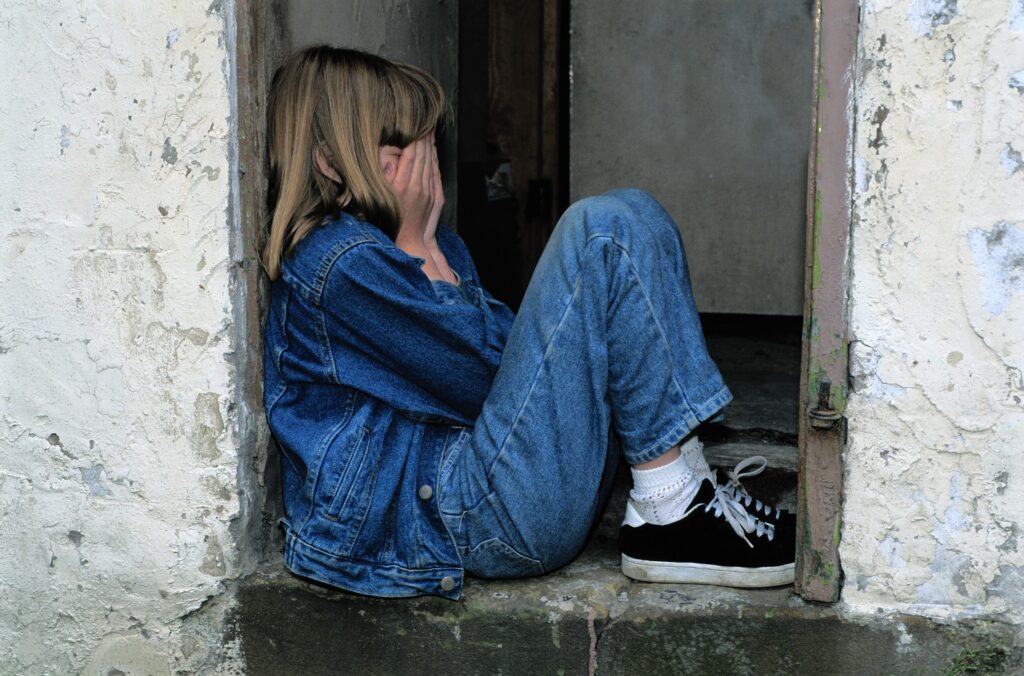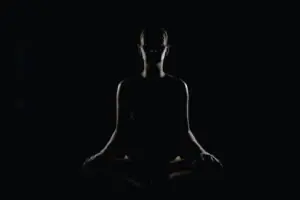Childhood lays the foundation on which the remainder of your life builds. When childhood trauma occurs, you carry those emotional scars with you into your future. Our worldview forms during childhood based on our experiences, and when your early experiences are frightful, you may be left struggling with fear. So, if you’re wondering, “Can childhood trauma cause anxiety?” The answer is yes. Keep reading to find out how.
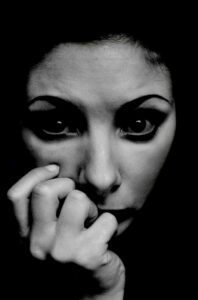 Let’s start with anxiety – What Is It?
Let’s start with anxiety – What Is It?
When you perceive a threat, your body automatically generates a response to prepare to tackle whatever the stressor is. This autonomic nervous system driven survival response affects you physically, emotionally, and mentally as your body prepares to defend itself.
This response to the perceived threat can generate negative thoughts, a sense of apprehension or dread, and physically energize your body by increasing your heart rate and breathing. All of these changes occur automatically, with little choice by you, because your body and mind believe it is fighting for your survival. This is an experience of anxiety. It’s meant to be short-lived, a response to a discreet threat.
So anxiety is a natural response to stress that can prove beneficial, depending on the circumstance.
However, if your feelings of anxiety are extreme, interfere with your day to day activities, and/or last longer than six months, it’s beyond the “normal” response. It has crossed over into a disorder. Anxiety disorders are the most common mental health issue in the United States, affecting 18% of the population each year, however many do not seek help. When anxiety is controlling your life, a mental health professional can help you learn how to gain control back.
What is childhood trauma?
Trauma can occur at any point in your life. It can trigger a host of emotional and physical reactions that make you prone to different mental and physical conditions. And, when trauma occurs in childhood, it can lead to adult anxiety.
Traumatic events are incidents that make you believe you are in danger of significant injury or death. Notably, your perspective of the event can make it traumatic. Regarding childhood abuse trauma, Andrea Roberts of the T.H. Chan School of Public Health at Harvard explains:
“By abuse, we often mean things that are a lot milder than things people typically think of as abuse. It might include being hit with a hard object, like a whip, a belt, or a paddle. The behavior doesn’t necessarily need to be illegal to induce a traumatic response. While a child’s life may not have actually been in danger, the child may have seen it as life-threatening.”
Related reading: Why does childhood trauma affect adulthood?
Here are some common examples of events that may lead to childhood trauma: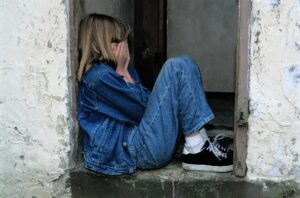
- Chaos or dysfunction in the home (domestic violence, parental mental illness, substance abuse, parental incarceration)
- Parental emotional abuse (insults, aggression)
- Emotional neglect or lack of nurturing environment
- Death of a loved one
- Physical abuse
- Sexual abuse
- Accidents or serious medical conditions or medical procedures
- Separation from a parent or caregiver
Bad things do happen during every childhood. Part of the maturation process is learning how to understand, process, and cope with difficulties. However, some children get stuck with a sense of fear and loss. Safety and control over their own lives feel illusive. Trauma occurs when these feelings are so intense they interfere with the child’s typical physical, emotional, social, or intellectual development.
So, can childhood trauma cause anxiety?
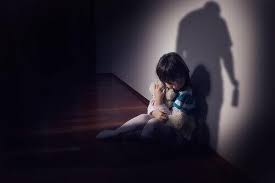 When trauma occurs, it can affect one’s faith in the future. Short-sighted future expectations occur when there is a loss of hope or limited expectations of life. For example, a belief life will end early, or that expected life events, like career success or a committed relationship will not occur. Anxiety is all about a fear of the future. Difficulty controlling anxiety can be particularly common for trauma survivors when the trauma happened at a young age.
When trauma occurs, it can affect one’s faith in the future. Short-sighted future expectations occur when there is a loss of hope or limited expectations of life. For example, a belief life will end early, or that expected life events, like career success or a committed relationship will not occur. Anxiety is all about a fear of the future. Difficulty controlling anxiety can be particularly common for trauma survivors when the trauma happened at a young age.
So, can childhood trauma cause anxiety? Absolutely. Childhood trauma can shape you to believe that your future will not be as full as others. This causes anxiety. And unfortunately, anxiety as a result of childhood trauma isn’t a fear of what could happen – which is the case for most individuals suffering from anxiety disorders. The anxiety from childhood trauma stems from the fear that it will happen again.
Related reading: 3 ways childhood trauma can affect your adult relationships
Trauma affects everyone differently. Its impact can be subtle, insidious, or even destructive. How traumatic events affect an individual depends on personal characteristics, developmental age at the event(s), the meaning of the trauma, and sociocultural factors. For children who experience trauma, it wires their brains for fear.
A child’s brain is learning at an incredible rate as they develop. And all the information that a child is learning comes from 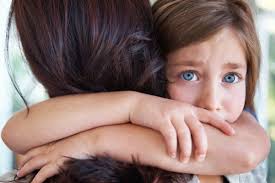 their experiences and environment. In a healthy, developmental context, a child’s brain recognizes safety and pleasure and drives engagement and exploration of the world. This leads to the ability to learn and build attachments with caregivers, family, and friends.
their experiences and environment. In a healthy, developmental context, a child’s brain recognizes safety and pleasure and drives engagement and exploration of the world. This leads to the ability to learn and build attachments with caregivers, family, and friends.
However, traumatized children more often feel fear, terror, or helplessness. Their brains are focused on self-protection because they perceive their environment as unsafe. These children may be unable to learn well and have difficulty connecting with others. They may also have a hard time developing a sense of self or pleasure because they disengaged and withdrew to protect themselves.
The more children perceive their environment as unsafe, the faster their brains will respond to potential harm – and perceive danger even if it’s not there. This anticipation of future trauma turns into anxiety that can continue into their adult life.
Road to recovery
 So now you know that the answer to the question “can childhood trauma cause anxiety?” is definitely yes. If you experienced childhood trauma and have anxiety, it is probably linked.
So now you know that the answer to the question “can childhood trauma cause anxiety?” is definitely yes. If you experienced childhood trauma and have anxiety, it is probably linked.
But what to do now? You or someone you love may be struggling with anxiety caused by childhood trauma and not know where to begin. The feeling of helplessness about the anxiety may be so pervasive that you feel trapped in the pattern of fear and panic. But with help, it is possible to break the cycle of anxious thoughts and sensations.
Short term goals include learning how to relax and calm your body, becoming aware of and changing automatic patterns of anxiety, and building a system of support. Long term goals include processing through childhood trauma, so you no longer have to carry it with you. Working with a therapist, especially one trained in Somatic Experiencing therapy or EMDR therapy, can help you develop a personalized plan that will give you the awareness, skills, and support needed to break free of anxiety.
If you are struggling with childhood trauma and anxiety, many of our therapists have experience with treating trauma and can help you or a loved one begin the path towards healing today. Please reach out to us at our Glen Ellyn, Chicago (Jefferson Park), or Sycamore.
Rhonda Kelloway is the owner and principal therapist at Life Care Wellness, a group psychotherapy practice in Glen Ellyn, Sycamore, Yorkville, and Chicago (Jefferson Park neighborhood), Illinois. She is a trauma specialist using a Somatic Experiencing framework to utilize the body’s wisdom in healing. She also uses EMDR and a variety of traditional psychotherapy approaches in her work. In addition to being a psychotherapist, she is a trained divorce and family mediator.

